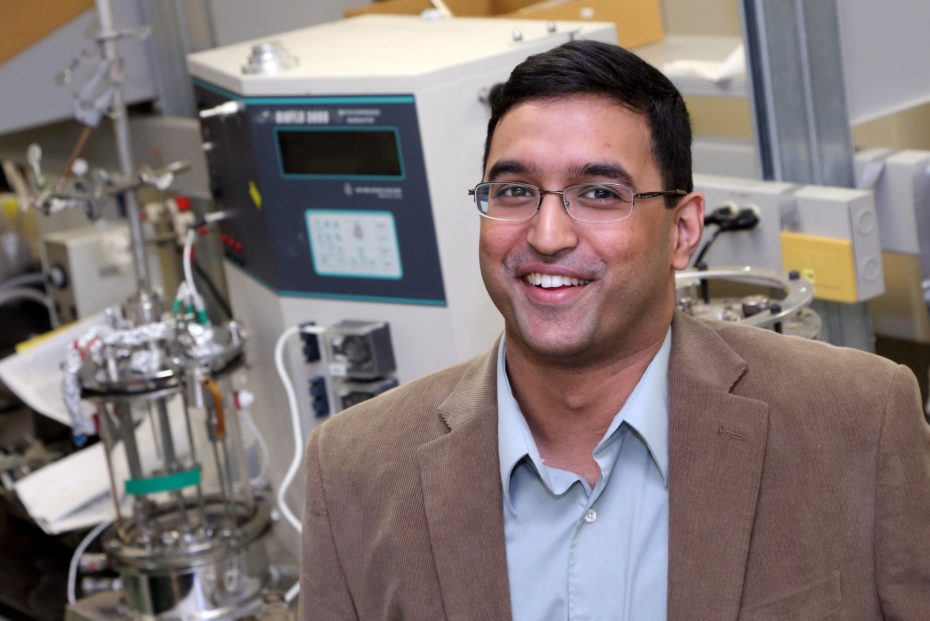
Like many professors, Christopher Moraes from the Department of Chemical Engineering, wears two hats – one as a researcher, the other as a teacher. The thing is, he does both really well.
At Spring Convocation this past June, Moraes, an accomplished scholar with research expertise in microtechnologies for engineered tissues, was one of three young investigators awarded the Principal’s Prize for Outstanding Emerging Researchers.
Skip ahead less than five months to today’s Fall 2020 Virtual Convocation and there he was again, this time being feted as winner of the Principal’s Prize for Excellence in Teaching in the Assistant Professor category.
Tough start
Moraes has come a long way from his early days in front of a classroom. “I remember how nervously enthusiastic I was, and how little I suspect my students actually learned,” he says of his first teaching experience. “I know I didn’t understand what my students needed. Things that I thought were incredibly complex, they got within minutes. What I found hilarious, produced glassy-eyed stares; and what that I thought was perfectly clear coming out of my mouth, was unintelligible gibberish going into their ears.”
“Some of these things still haven’t changed,” he says with a smile.
A member of the Department of Chemical Engineering since 2014, Moraes says that even though he doesn’t remember a specific moment when he committed to being a teacher, it was always something he enjoyed doing.
“As a graduate student, I TAed for a range of undergraduate courses, and would spend my time every summer living-in at an engineering outreach program for high school students,” he says. “My mentors and supervisors gave me the freedom to try new things (and fail at them), and I enjoyed the challenge of delivering complex academic content. I eventually ended up teaching my own course while completing my graduate degree, and while that was very stressful, I was surprised at how much I enjoyed it.”
Facing the challenges of COVID-19
Moraes is always looking for new pedagogical approaches to engage students and enrich their learning experiences. Since his arrival at McGill, he has been using active learning techniques and flipped classrooms in his courses – always sharing his experiences with other professors, both inside his Faculty and beyond.
Moraes teaches undergraduate courses in Fluid Mechanics, Instrumentation & Measurement, and Research Techniques; as well as graduate courses in Research Skills & Ethics. But with COVID-19 throwing a monkey wrench into most in-person teaching, he has had to adapt – something he’s wired to do.
“One of the more interesting things I’m doing is developing ‘real’ lab experiences, that can be delivered remotely,” he says. “Rather than physically be in the lab, we are designing and building the infrastructure needed for students to log in online, design and build real experimental setups, operate real equipment remotely, collect real data, solve real problems, and draw real conclusions. Moving this level of flexibility online is certainly challenging, but I believe it will be a valuable learning experience.”
Work in progress
Not surprisingly, Moraes gets glowing reviews from his students. They praise him for everything from the numerous hours he invested in designing video-tutorials on an open-source hardware called Lightboard, to his continued support for design teams, and his supervision of students doing summer research.
“I generally enjoy being around people who challenge, support, and push me; and are open to being challenged in return,” he says. “My students certainly do that for me, and I hope that they find value in how I return the favour.”
For his part, Moraes loves the diversity of the students he works with, and “if I were forced to make a generalization, I’d say McGill students are extremely bright and innately talented, with a smidgeon of underlying insecurity.”
Of course, there are challenges. Moraes says he finds it difficult “putting myself into the head-space of my students. This generation faces challenges that would have made me want to curl up and stay in bed. Global pandemics, gig economies, climate change, wealth inequality, mental health – it’s a different world out there for learners,” he says. “How can I understand my students well enough to deliver valuable, rigorous and challenging learning experiences? I know I haven’t gotten it right yet, I think this will always be a work-in-progress.”
